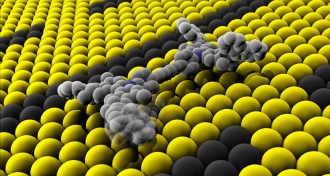All Stories
-
 Tech
TechHooking fish, not endangered turtles
A tuna fisherman has taken it upon himself to make the seas safer for sea turtles, animals that are threatened or endangered with extinction worldwide. He’s designed a new hook that he says will make bait unavailable to marine birds and turtles until long after it’s sunk well below the range where these animals venture to eat.
By Janet Raloff -
 Astronomy
AstronomySupernova may have kicked off solar system
Force of explosion could explain chemical mysteries contained within asteroids.
By Nadia Drake -
 Humans
HumansFuture wars may be fought by synapses
Neuroscientists consider defense applications of recent insights into how the brain works.
-
 Health & Medicine
Health & MedicineHands off and on in schizophrenia
A broken connection to one’s physical self may cause a rubber hand to seem like a real one.
By Bruce Bower -
 Health & Medicine
Health & MedicinePrompt liver transplant boosts survival in heavy drinkers
Some patients with severe organ inflammation from alcohol use can benefit from the operation.
By Nathan Seppa -
 Space
SpaceHow the moon got its magnetism
Earth’s tug or asteroid impacts may have generated the ancient lunar magnetic field.
By Nadia Drake -
 Life
LifeTwo steps to primate social living
Evolutionary shifts about 52 million and 16 million years ago led to the group structures observed today, researchers argue.
By Nick Bascom -
 Tech
TechTiniest car gets a test drive
Scientists build the world's tiniest electric 'roadster,' and zap it into action.
-
 Life
LifeA gland grows itself
Japanese researchers coax a pituitary to develop from stem cells in a lab dish.
-
 Life
LifePrehistoric horses came in leopard print
Dappled animals, once thought to be the result of selective breeding after domestication, were around when early humans depicted them on cave walls.
-
 Life
LifeSchool rules
Fish coordinate with one, or perhaps two, of their neighbors to make group travel a swimming success.
By Devin Powell -
 Paleontology
PaleontologyDNA suggests North American mammoth species interbred
Supposedly separate types may really have been one.
By Susan Milius